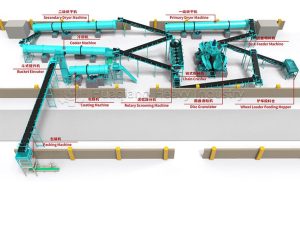In this era of pursuing sustainable development and ecological balance, agriculture, as the foundation of the country, is particularly important for its transformation and upgrading. With the continuous improvement of people’s awareness of food safety and environmental protection, the disadvantages of traditional chemical fertilizers have become increasingly prominent, and organic fertilizers are gradually becoming the new favorite of modern agriculture with their multiple advantages such as improving soil structure, improving crop quality, and promoting ecological balance. Today, let us walk into the world of organic fertilizer production lines and explore the secrets of this green revolution.
1. Technology-led, innovation-driven
The organic fertilizer production line is a perfect combination of modern agricultural technology and environmental protection concepts. It integrates cutting-edge technologies such as mechanical automation, biotechnology, and intelligent control, and realizes full intelligent management from raw material processing, fermentation control, nutrient balance to finished product packaging. This innovation not only greatly improves production efficiency, but also ensures the stable quality of each batch of organic fertilizers.
2. Recycling, turning waste into treasure
After being processed by the organic fertilizer production line, resources that were originally regarded as “waste” such as livestock and poultry manure, crop straw, and food processing waste have been transformed into high-quality fertilizers rich in organic matter, trace elements, and beneficial bacteria through scientific proportioning and biological fermentation technology. This process not only solves the problem of environmental pollution, but also maximizes the utilization of resources, setting an example for the development of circular agriculture.




